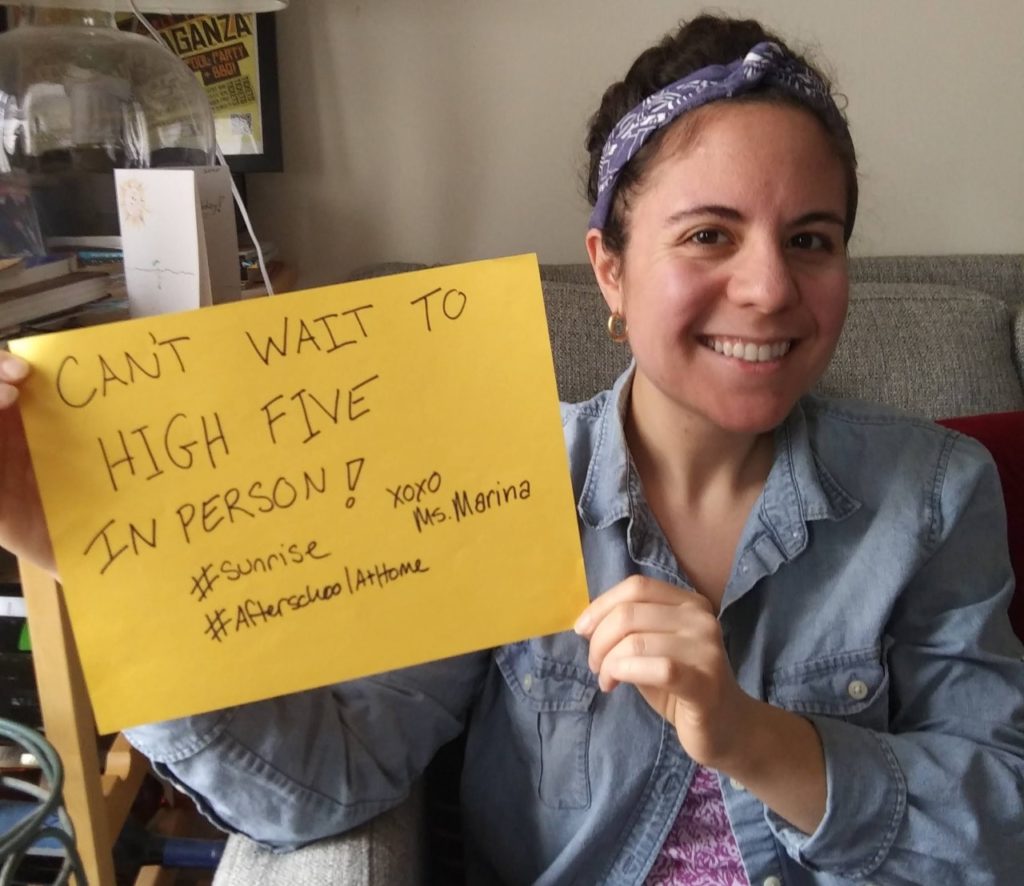
Ask Marina Fradera about going to Goddard Riverside Head Start as a child, and the memories come tumbling out.
“I remember the location feeling mysterious. I remember feeling scared but excited to go. My grandfather would walk me every day and that was always a pleasant thing.”
Fradera loved her classroom and the things it contained. “The Night Kitchen was my favorite book; I remember exactly where it was on the bookshelf. I remember being able to do a lot of art; there were different types of paper to cut, and sand and water and paint and glue to play with. It was a very multi-sensory experience for me.”
It seems appropriate, then, that Fradera is still working in classrooms with small children. As an expert in trauma at Sunrise of Philadelphia, a nonprofit serving children and youth, she helps students and teachers alike cope when bad things happen.
Trauma, she says, isn’t just something that affects people directly; you can also be affected by contact with others who are experiencing it: “It’s like secondhand smoke. So even if I don’t smoke, if I’m in proximity to it I’ll have the symptoms of a lifetime smoker.”
People of all ages have faced traumas this year due to the COVID-19 pandemic. Those may include death and illness in the family, isolation, economic duress, the stress associated with the switch to online learning, and more.
Fradera says some of her students are doing well—perhaps even better than they did before COVID, because they’re getting extra support. Others are struggling. She cautions that it may be years before we fully see the impacts of today’s stresses. But, she says, there are things we can do to mitigate them.
Fradera offers the tips below for adults dealing with trauma. For helping children, she recommends these resources from NPR..
- Self Care: It’s kind of an overused and sometimes trivialized concept right now, but checking in and doing something to care for your own well being is one of the most powerful things we can do for ourselves right now. This can be as quick as 3 minutes. It can be as simple as making a list or listening to a song on purpose (not just as background noise). The Chicago Torture Justice Center created two great workbooks for anyone looking for a structured way to create an intentional self care plan. It’s important to acknowledge that self care doesn’t always feel good, but we know it’s good for us (e.g., doing the dishes, showering, getting out of bed, etc.).
- Mindset: Acknowledging that nothing is normal right now can be validating and healing. Most of our brains and bodies are in “survival” mode, whether consciously or unconsciously, so we may not always have access to higher order thinking skills for executive functioning. We’re instinctively redirecting energy to producing chemicals that help us respond to acute stress. What we’re experiencing, however, is sustained stress. Figuratively speaking, without intentional practices, our brains/ nervous systems will always aim to “sprint” rather than endure a “marathon.” This is the reason we are forgetting to do things. This is the reason we’re exhausted even with 8 hours of sleep. Accepting this can keep us from confusing ourselves into thinking “something’s wrong with me” or “I’m a bad parent/ partner/ coworker” and begin to shift into a marathon mindset with built-in recovery time (see above self care).
- Somatic Sensory Self-Soothing: Traumatic impact occurs when we perceive terror and loss of control. It starts at a physical, sensory level. We all have different sensory “tells” (back pain, heart rate, tight chest) but don’t always realize we’re “off” until we have an emotional response, such as yelling at others or unexpectedly crying. Working to understand our own sensory “tells” and which senses respond best to soothing strategies can help us be well and show up for others before we become emotionally unavailible. This may be as simple as slowly rubbing your index fingers and thumbs together (i.e. the “money” sign) or taking extra deep sniffs of a cup of coffee or tea. It’s worth it to test out something that feels nice for each of your 5 senses and to activate the ones that feel extra good when you notice your mood or body shift.
- Balance: Kids are still accomplishing the serious work of play. They are also aware of how things “aren’t right” at the moment. Adults can make room for both of these things for themselves as well as for children. Being positive can be as harmful as being negative all the time. Holding space for all the feelings in between and making them okay can help us tap into the right kind of comfort at the right time.
- Get/ Offer Help: We are social primates. We literally NEED other humans to maintain equilibrium and heal from traumatic impact. Seek out peers to create joy and grieve together. Reaching out for help and checking-in on others are both part of staying well and healing. We can automate this with group texts, or specific “self-care” chat channels for virtual coworkers. NYC also has a 24/7 hotline in 4 different languages for those dealing with stress, depression, anxiety, and substance use.